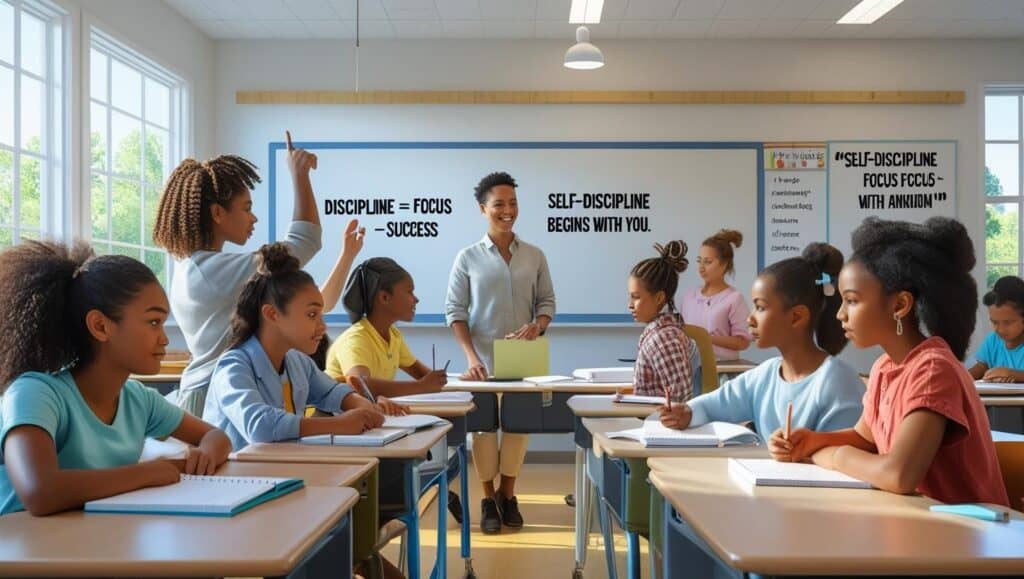Can you imagine for a moment? A classroom where all the students are listening to their teacher with full attention. There is no noise from anywhere. The environment is completely peaceful. There are no fights or arguments in the class. Students respect each other and study without any interruptions.
Discipline in school is not merely a guideline, but a fundamental principle that shapes students’ lives.
Just imagining it feels so pleasant. How wonderful would it be if this became a reality?
Discipline in school cultivates a productive environment that fosters better learning outcomes.
It’s important to recognize that discipline in school is not just about rules, but about nurturing personal growth.
This is not just imagination or a dream — we can achieve it in real life too. When we learn to be disciplined, we realize that discipline is the identity of success.
Whether you are a student, a parent, or a teacher — it doesn’t matter. Understanding the importance of discipline can bring a significant change in students’ behavior and learning.
In this article, you will learn why discipline is important in school, the types of discipline, and how to apply it in our daily lives.
For instance, implementing discipline in school can lead to heightened academic achievement and improved interpersonal skills.
Table of Contents
What Is Discipline in School?

Discipline in school refers to practicing various rules such as arriving at school on time, not making unnecessary noise in the classroom, completing tasks regularly, and avoiding fights or quarrels. It helps create a positive environment that makes the educational journey successful.
Why Is Discipline Important in School?
A school is a treasure house of knowledge where millions of people go to gain new learning. According to UNESCO, discipline plays a key role in creating inclusive and effective learning .That’s why discipline is essential in school:
Thus, establishing discipline in school can pave the way for enriching educational experiences.
- Creates a disciplined environment in the classroom
- Increases respect toward teachers and classmates
- Enhances consistency in studies
Ultimately, fostering discipline in school will yield benefits that extend well beyond the classroom.
- Develops character and moral thinking
Ultimately, discipline in school is a foundational element that supports lifelong success.
Without discipline in school, students may struggle to achieve their goals in a structured manner.
- Reduces distractions, allowing better focus on important task
- Promotes peaceful learning
Types of Discipline
There are different types of discipline that you may not have been aware of. The three main types are:
Self-Discipline
When students take actions on their own understanding — such as waking up on time, doing homework, or controlling their emotions — it is known as self-discipline.
Teacher-Imposed Discipline
This refers to discipline enforced through school or teacher-made rules, such as sitting quietly in class, completing work on time, showing respect, and not doing anything without permission.
Overall, embracing discipline in school is essential for nurturing a supportive learning environment.
Positive vs. Negative Discipline
We all have both positive and negative discipline within us.
Positive Discipline: Based on encouragement. It inspires internal motivation and has long-term positive effects.
Negative Discipline: Based on punishment. It may create fear and show short-term results only.
How to Teach Discipline in School
Discipline is a must in school because it is a place of knowledge. Schools can help students learn discipline in the following ways:
Additionally, when discipline in school is valued, it leads to better conduct among peers.
Role of Teachers:
- Establish clear rules and provide fair consequences for those who don’t follow them
- Praise students who demonstrate good behavior to encourage others
Furthermore, discipline in school encourages students to take responsibility for their actions and decisions.
- Regularly share examples of students or individuals who act responsibly
Role of Parents:
A student’s level of discipline at school is influenced by the home environment. Here’s how parents can help:
- Encourage children to follow school rules at home
- Teach them the importance of time management
- Stay in contact with teachers, especially those teaching their child
Daily Habits:
Students should also learn to be self-disciplined, even without teachers or parents. Here’s how:
- Have a fixed morning routine
- Set a regular time for studying
- Keep a daily journal or do self-reflection These habits help build discipline day by day.
Classroom Management:
Managing the classroom regularly also helps students become more disciplined:
- Organize your seating area
- Participate in group work with clear rules
Daily reinforcement of discipline in school practices can help students internalize these important lessons.
- Use responsibility boards or behavior charts to track progress
10 Benefits of Discipline in School
- Improves academic performance
- Strengthens student-teacher relationships
- Increases focus in studies and other activities
- Develops strong moral values
- Builds thoughtful decision-making skills
- Encourages teamwork, essential for success
- Remember, discipline in school is not just an expectation; it’s an opportunity for growth.
- Builds self-confidence
- Enhances the school’s reputation
- In conclusion, discipline in school serves as a guiding principle for future aspirations.
- Prepares students to face challenges
Difference Between Discipline and Punishment
You might wonder — is there any comparison between discipline and punishment? If you think they can’t be compared, you’re mistaken. Both have their own importance. Punishment may sound harsh, but here’s the difference:
Discipline
- Teaches proper behavior
- Brings long-term change
- Focuses on teaching Focuses on fear
- Builds self-control Creates temporary change
Punishment
Furthermore, discipline in school equips students with essential skills for personal accountability.
- Penalizes for wrong behavior
As such, the role of discipline in school cannot be underestimated in shaping responsible citizens.
- Offers short-term solutions
- Focuses on fear
- temporary change
Real-Life Examples & Inspirational Quotes
Jim Rohn once said, “Discipline is the bridge between goals and accomplishment.”
We’ve seen this in real life — students who consistently stay disciplined and focused on their work always perform well in exams and remain stress-free.
In Japan, schools do not hire cleaners for classrooms. Students clean their own classrooms, which teaches them responsibility and discipline.
Moreover, discipline in school is crucial for transforming the educational landscape for every student.

Final Thoughts
Discipline is important not only for students but for everyone. In school, discipline is not just about following rules — it is about developing the mindset, habits, and practices that lead to success in life.
When students learn to control themselves, respect others, and stay focused on their studies — they don’t just pass exams; they succeed in life.
Positive outcomes from discipline in school can translate to enhanced career prospects in the future.
Now it’s your turn! This is not just imagination — discipline can make that dream-like classroom and life a reality.
Small habits make a big difference. Let’s practice respect, consistency, and responsibility in our daily lives. Start a new disciplined habit today.
How are you applying discipline in your daily life? Don’t forget to comment and share your experience with us! Let’s all keep learning, growing, and succeeding together.
In addition, discipline in school creates a framework for students to explore their potential while minimizing distractions.
It’s vital to share how discipline in school has positively impacted your life experiences as well.
Thus, we must emphasize discipline in school as a core value for all students.
